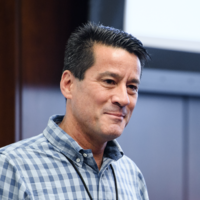Assessing the Promise of Artificial Intelligence Speakers: Difference between revisions
From Santa Fe Institute Events Wiki
No edit summary |
|||
| Line 15: | Line 15: | ||
---- | ---- | ||
'''March 12, 2020'''<br /> | '''POSTPONED <S>March 12, 2020</s>'''<br /> | ||
Goldman Sachs Headquarters<br/> | Goldman Sachs Headquarters<br/> | ||
200 West Street<br/> | 200 West Street<br/> | ||
Revision as of 16:14, 19 March 2020
SFI ACtioN Roundtable
POSTPONED March 12, 2020
Goldman Sachs Headquarters
200 West Street
New York, NY 10282
Speakers Include:

Santa Fe Institute
Jessica Flack is Professor at the Santa Fe Institute and Director of SFI's Collective Computation Group (C4). Research in C4 draws on evolutionary theory, cognitive neuroscience and behavior, statistical mechanics, information theory, dynamical systems and theoretical computer science to study the roles of information processing and collective computation in the emergence of robust structure and function in biological and social systems. Goals include identifying the computational principles that allow nature to overcome subjectivity due to information processing to produce ordered states and understanding why adaptive systems typically have many space and timescales. A central idea is noisy information processors construct their macroscopic worlds through collective coarse-graining in evolutionary and/or learning time. In other words, how the appropriate aggregation of information from individuals making decisions under uncertainty can produce good collective forecasts. Flack was previously founding director of University of Wisconsin-Madison's Center for Complexity and Collective Computation in the Wisconsin Institutes for Discovery. Flack's work has been covered by scientists and science journalists in many publications and media outlets, including the BBC, NPR, Nature, Science, The Economist, New Scientist, Current Biology, The Atlantic, and Quanta Magazine.

University of Pennsylvania and Santa Fe Institute
Michael Kearns is a professor in the Computer and Information Science department at the University of Pennsylvania, where he also has appointments in the Economics department and Wharton School, and External Professor at the Santa Fe Institute. He is founder and co-director of Penn’s Warren Center for Network and Data Sciences, and he is Senior Advisor in Morgan Stanley’s Center of Excellence for Machine Learning and AI. Kearns has long experience as a quant on Wall Street and as a consultant in the technology industry. His research interests are in machine learning, algorithmic game theory and quantitative trading. Kearns and his Penn colleague Aaron Roth are co-authors of the general-audience book The Ethical Algorithm: The Science of Socially Aware Algorithm Design (Oxford University Press, 2019).

Santa Fe Institute and Portland State University
Melanie Mitchell is the Davis Professor of Complexity at the Santa Fe Institute, and Professor of Computer Science (currently on leave) at Portland State University. Her current research focuses on conceptual abstraction, analogy-making, and visual recognition in artificial intelligence systems.
Melanie is the author or editor of six books and numerous scholarly papers in the fields of artificial intelligence, cognitive science, and complex systems. Her book Complexity: A Guided Tour (Oxford University Press) won the 2010 Phi Beta Kappa Science Book Award and was named by Amazon.com as one of the ten best science books of 2009. Her latest book is Artificial Intelligence: A Guide for Thinking Humans (Farrar, Straus, and Giroux).
Melanie originated the Santa Fe Institute's Complexity Explorer platform, which offers online courses and other educational resources related to the field of complex systems. Her online course “Introduction to Complexity” has been taken by over 25,000 students, and is one of Course Central’s “top fifty online courses of all time”.

Santa Fe Institute
Mike Price is an Applied Complexity Fellow at the Santa Fe Institute. Mike earned his Ph.D. in Anthropology from Stanford University and was a Post- doctoral Researcher at Pennsylvania State University. Prior to that he earned a B.S. in Physics from Harvey Mudd College and has spent time working as an engineer at Raytheon Space and Airborne Systems. Mike also served as an SFI-ASU Postdoctoral Fellow from 2017 to 2019. Mike is interested in economic decision making in the broadest sense. This includes both conventional economic decisions, such as which toothpaste to buy or whether to borrow money to purchase a house, and less conventional economic decisions, such as whether to hunt for monitor lizards or kangaroos as a forager in Australia’s Western Desert or whether to allocate scarce resources to current or future reproduction.
He is currently exploring how evolutionary theory can be linked with economic theory to better understand human decision making. He hopes that this may lend insight into recent experimental work in behavioral economics that has uncovered systematic deviations between the predictions of standard economic models of rational choice and observed behavior.

Dartmouth College and Santa Fe Institute
Dan Rockmore is Neukom Director, William H. Neukom 1964 Distinguished Professor of Computational Science, Associate Dean of Science faculty at Dartmouth College, and an External Professor at the Santa Fe Institute, where he sits on its Science Steering Committee. Dan went to Dartmouth College in 1991 after completing his undergraduate work at Princeton University and earning his Ph.D. at Harvard University. His work in complex systems, harmonic analysis, and machine learning has been supported by the NSF and NIH. He is also the co-producer of four documentaries and his writing for the general public has appeared in The New Yorker, Slate, and the Atlantic. His most recent book is the edited volume What are the Arts and Sciences? A Guide for the Curious (UPNE).

